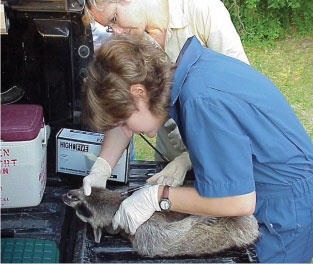Conventional wisdom tells us that some find comfort in the routine of their jobs while others thrive on variety. Jennifer McQuiston (biology '93; D.V.M. '97; M.S. molecular microbiology '98), a veterinary epidemiologist in the Viral and Rickettsial Zoonoses branch of the Centers for Disease Control and Prevention (CDC) in Atlanta, is squarely among the latter group.
"One of the things I enjoy most about my job," McQuiston says, "is the variety of day-to-day activities. One minute I may be sitting at my desk looking at disease reports, and the next moment I am on a plane to God-knows-where to investigate an unusual disease outbreak. Often, I don't know what to expect when I get there or what problems I may encounter upon arriving." Surprises notwithstanding, McQuiston, whose work focuses on the incidence, distribution, control, and prevention of diseases that can be transmitted from animals to humans, more than knows the ropes. The veterinarian moved into her present position after having participated in the CDC's Epidemic Intelligence Service, a two-year program that trains epidemiologists to conduct disease outbreak investigations. Now one of the CDC's elite "disease detectives" tracking outbreaks in the U.S. and abroad, McQuiston found her niche by way of a seemingly circuitous route. "I discovered this field of work by accident. During my fourth year of veterinary school, I had the opportunity to participate in an externship at the CDC that I expected to be laboratory research-oriented. I was shocked to find out that the externship was actually focused on epidemiology when they sent me to New York City on an influenza outbreak investigation! I fell in love with the fast pace of an outbreak investigation, and I've never looked back." Because of her training and expertise, McQuiston was sent back to Manhattan on Sept. 11, 2001, when the CDC was called upon to assist the New York City Department of Health with crisis management, epidemiology, and surveillance following the World Trade Center attacks. As a member of the center's emergency first-response team into New York only four hours after the attacks, she remained in the city for six weeks, tracking the subsequent anthrax assaults and monitoring unusual symptoms or syndromes among those affected by the attacks. "That's probably one of the times I was most proud of her," says McQuiston's husband of six years, John (M.S. veterinary medical science '92), a microbiologist at the CDC. These days, despite a national shift from crisis management to longer-range public health activities, McQuiston and the CDC epidemiologists continue to play a major role in an ongoing effort to upgrade the nation's response to threats of biological and chemical terrorism. In keeping with the center's goals, McQuiston frequently presents lectures and was invited back to the Virginia-Maryland Regional College of Veterinary Medicine in the summer of 2002 to deliver the keynote address at the college's 14th Annual Research Symposium, a talk that highlighted the CDC's involvement in the war against biological terrorism. The 2003 recipient of the Daniel E. Salmon Award for Federal Veterinarian of the Year from the National Association of Federal Veterinarians, McQuiston is also a lieutenant commander in the U.S. Public Health Service, a lesser known branch of the military. In this capacity, she takes active part in the national surveillance for and the investigations of outbreaks involving zoonotic diseases--and she is not immune to her work's significance. "The part of my job that makes me the most proud is the service component," says McQuiston. "I am proud to be a public servant and feel a great deal of job satisfaction in helping others. I truly feel as if I make a difference in the world and that my job helps people's lives." McQuiston acknowledges that her undergraduate experience at Tech guided her down the right career path: "One of the most influential professors I encountered at Tech was Dr. G. William Claus, who taught microbiology. Through his influence, I developed an intense interest in microbiology and molecular biology; and with his help, I was one of the founders of Alpha Sigma Mu, the microbiology club at Virginia Tech. Dr. Claus was also instrumental in helping me secure my first summer internships and in writing letters of recommendation to veterinary school. I will always be grateful for his interest and wonderful style of teaching. I understand that he retired in 2002. Thanks for everything, Dr. Claus!" McQuiston asserts, too, that her decision to pursue a D.V.M. at Tech has served her well in her professional life. "I believe veterinary school in general prepares you well to deal with this career choice, perhaps even more so than medical school," she says. "As veterinarians, we are trained to think of disease prevention in terms of 'herd health,' a concept very similar to human public health because it focuses on the health of the overall population rather than on individual patient care." After receiving her doctorate, the new veterinarian stayed on at Tech an additional year to earn an M.S. in molecular microbiology. "I am proud to credit my entire education to Virginia Tech," McQuiston says. "Although some may say I have ended up on a fairly narrow and unusual career path, Tech had the variety of coursework and professional interests to teach me what I needed to excel in this area." The mother of a daughter born in October 2002, McQuiston has her hands full, at least from an outsider's perspective, and she clearly prefers the fast pace. Although she believes that problem-solving and communication skills are two of her strengths, both necessary to enjoy her line of work, one cannot help but speculate that her attraction to travel, change, and challenge is probably stronger. And that's just how she likes it. |
